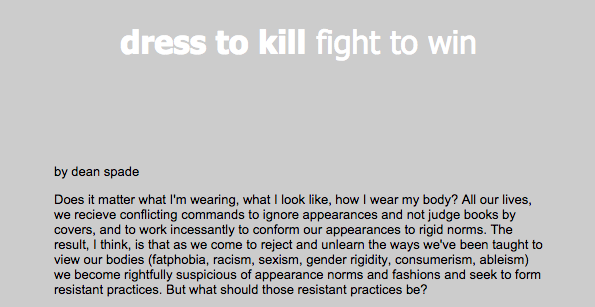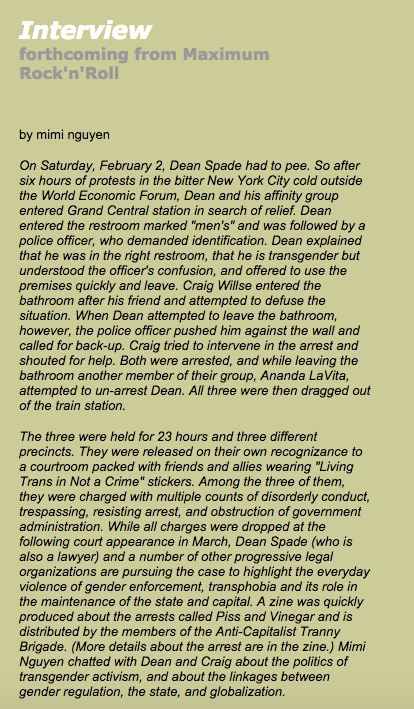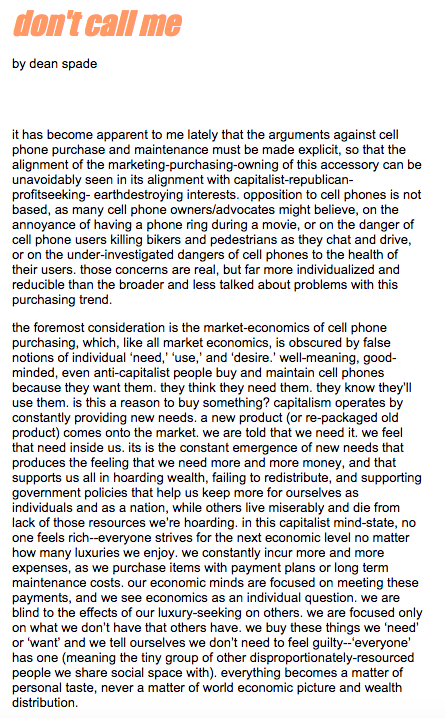I wrote “Resisting Medicine/Remodeling Gender” published in Berkeley Women’s Law Journal in 2003 and reprinted in Sexuality, Gender, and the Law, edited by William Eskridge and Nan Hunter in 2004. You can read it here.
Dress to Kill, Fight to Win
Undeserving Addicts: SSI/SSD and the Penalties of Poverty
I wrote “Undeserving Addicts: SSI/SSD and the Penalties of Poverty” in Howard Scroll: The Social Justice Law Review in 2001. You can read it here.
Abstract
Since the late 1980’s, American media and politicians have produced and participated in a moral panic around the issue of illegal drug use. This panic has generated vivid pictures in the American imagination of drug users as a morally depraved, irresponsible, and willfully criminal underclass. Such images have fueled the “war on drugs,” a multi-faceted rhetoric and policy approach to drug use that focuses on incarceration, interdiction, and other criminal justice strategies. The punitive approach of the war on drugs has bled into poverty and disability policy with alarming persistence. The trend has influenced numerous poverty alleviation and disability programs and protections, leaving drug users increasingly isolated and unaided. This comment explores the impact of such changes on the Americans with Disabilities Act 2 (ADA) and two social security policies, Supplemental Security Income (SSI) and Social Security Disability Insurance (SSDI). It questions the wisdom of a punitive response to drug use by examining the alternative model of harm reduction and applying the principles of harm reduction analysis to the exclusion of drug users from poverty alleviation and disability programs. Part I describes recent changes in disability policy, which reflect a decrease in coverage for persons disabled by drug use. Part II describes the context in which these changes occurred, with the war on drugs in full force, and offers critiques of drug war strategy. Part 1I describes the harm reduction model as an alternative to the drug war approach. Part IV examines the impact of drug war policy on the poor, arguing that pushing drug users further into poverty by denying them public assistance will increase drug-related harms. Furthermore, this section suggests that strong social welfare systems can operate to reduce the intersecting harms of poverty and drug use.
Interview by Mimi Nguyen
Don’t Call Me
Confronting the Limits of Gay Hate Crimes Activism: A Radical Critique, with Craig Willse
I co-authored with Craig Willse “Confronting the Limits of Gay Hate Crimes Activism: A Radical Critique” in Chicano-Latino Law Review in 2000. You can read it here.
Abstract
Questioning the emancipatory potential of hate crimes activism for sexual and gender non-normative people, this paper outlines the limits of criminal justice remedies to problems of gender, race, economic and sexual subordination. The first section considers some of the positive impacts of hate crimes activism, focusing on the benefits of legal “naming” for disenfranchised constituencies seeking political recognition. In the next section the authors outline the political shortcomings and troubling consequences of hate crimes activism. First, they examine how hate crimes activism is situated within a “mainstream gay agenda,” a term they use to designate the set of projects prioritized by large, national gay rights organizations. The authors question the assimilationist drive of mainstream gay activism, and illustrate how such activism fails to reflect commitments to anti-racism, feminism, and economic redistribution. Second, they critique how the rhetoric of hate crimes activism isolates specific instances of violence against queer and transgender people, categorizing these as acts of individual prejudice, and obscures an understanding of the systemic, institutional nature of gender and sexuality subordination. Finally in this section, the authors interrogate hate crimes statutes as a practice of “identity politics” that, despite accomplishing certain goals, nonetheless dangerously reifies constructs of homosexual identity. In the third and final section, they look at how work on hate crimes occupies a place of “legitimacy” in the world of lesbian and gay activism. Preserving a sense of what hate crimes activism hopes to accomplish, they suggest other political strategies that pursue broader work for social and economic justice and build coalitions across identity categories.


